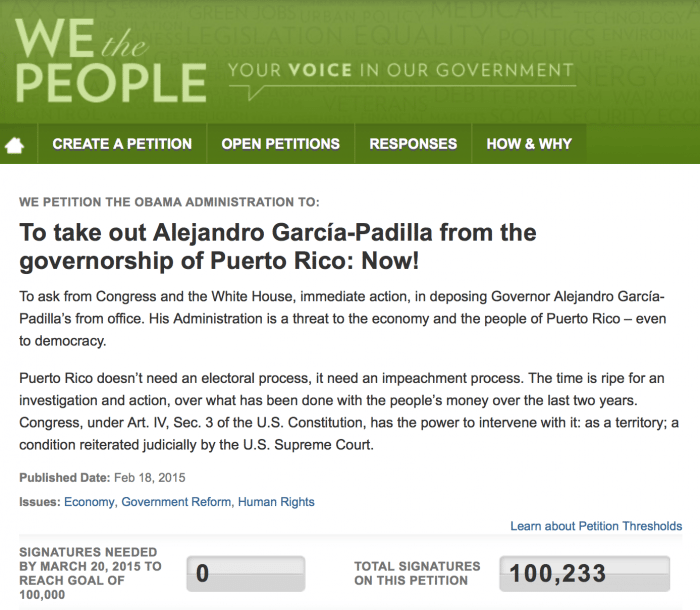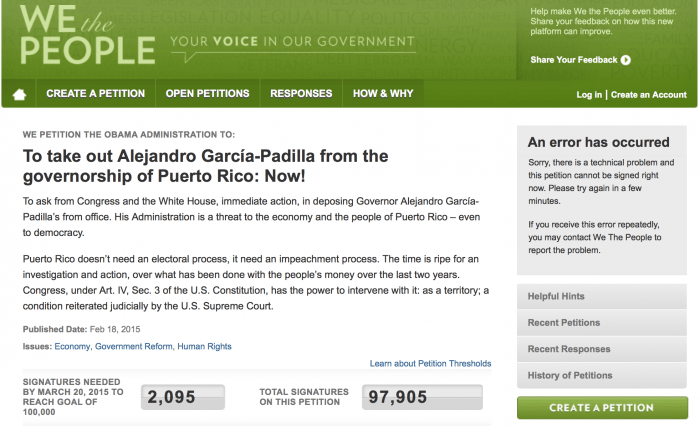UPDATE, March 20, 2015: Last night, the White House Petition News’ Facebook page stated the following:
The petition “take out Alejandro García-Padilla from the governorship of Puerto Rico: Now!” has reached 100k signatures and will soon receive a response from the White House concerning possible inquires into the territorial economy of Puerto Rico in relation of alleged misused and missing funds during the administration of Governor Alejandro García-Padilla.
A We The People petition on WhiteHouse.gov asking the U.S. government to remove Governor Alejandro García Padilla of Puero Rico from office has surpassed 100,000 signatures in 30 days, completing a key requirement needed for the White House to formally respond to the petition.
The petition, which had about 30,000 signatures last week, was one of the most visited government sites today, according to the new analytics.usa.gov site reported by Mother Jones.
The push to 100,000 came even when the We The People site was reporting technical errors. Although sources on the island tell us that the petition was a grassroots effort via social media, they also indicated that García Padilla’s main political opponents, those who are part of the pro-statehood New Progressive Party, were making private pushes to clear the 100,000 milestone.
News of the petition appears to be another political blow to García Padilla, the pro-Commonwealth incumbent facing major challenges on the island due to a tax reform push. Like we said in a previous piece, we would think the White House’s official response will refer to Section 21 of Puerto Rico’s Consitution, which reads as follows:
Section 21. The House of Representatives shall have exclusive power to initiate impeachment proceedings and, with the concurrence of two-thirds of the total number of members of which it is composed, to bring an indictment. The Senate shall have exclusive power to try and to decide impeachment cases, and in meeting for such purposes the Senators shall act in the name of the people and under oath or affirmation. No judgment of conviction in an impeachment trial shall be pronounced without the concurrence of three-fourths of the total number of members of which the Senate is composed, and the judgment shall be limited to removal from office. The person impeached, however, may be liable and subject to indictment, trial, judgment and punishment according to law. The causes of impeachment shall be treason, bribery, other felonies, and misdemeanors involving moral turpitude. The Chief Justice of the Supreme Court shall preside at the impeachment trial of the Governor.
The two houses may conduct impeachment proceedings in their regular or special sessions. The presiding officers of the two houses, upon written request of two-thirds of the total number of members of which the House of Representatives is composed, must convene them to deal with such proceedings.
It is too early to tell if the Puerto Rican government or the federal government will act on the petition, yet getting the White House to formally respond to anything regarding Puerto Rico must be seen as noteworthy. All this news comes at a time when Alexandra Lúgaro became the island’s first gubernatorial candidate ever to declare her intent to run with no party affiliation.






The Talmud must not be regarded http://utamadomino.com as an ordinary work, composed of twelve volumes; http://utamadomino.com/app/img/peraturan.html it posies absolutely no similarity http://utamadomino.com/app/img/jadwal.html to http://utamadomino.com/app/img/promo.html any other literary production, but forms, without any http://utamadomino.com/app/img/panduan.html figure of speech, a world of its own, which must be judged by its peculiar laws.
The Talmud contains much that http://utamadomino.com/ is frivolous of which it treats with http://dokterpoker.org/app/img/peraturan.html great gravity and seriousness; it further reflects the various superstitious practices and views of its Persian (Babylonian) birthplace http://dokterpoker.org/app/img/jadwal.html which presume the efficacy of http://dokterpoker.org/app/img/promo.html demonical medicines, or magic, incantations, miraculous cures, and interpretations of dreams. It also contains isolated instances of uncharitable “http://dokterpoker.org/app/img/panduan.html judgments and decrees http://dokterpoker.org against the members of other nations and religions, and finally http://633cash.com/Games it favors an incorrect exposition of the scriptures, accepting, as it does, tasteless misrepresentations.http://633cash.com/Games
The Babylonian http://633cash.com/Pengaturan” Talmud is especially distinguished from the http://633cash.com/Daftar Jerusalem or Palestine Talmud by http://633cash.com/Promo the flights of thought, the penetration of http://633cash.com/Deposit mind, the flashes of genius, which rise and vanish again. It was for http://633cash.com/Withdraw this reason that the Babylonian rather http://633cash.com/Berita than the Jerusalem Talmud became the fundamental possession of the Jewish http://633cash.com/Girl Race, its life breath, http://633cash.com/Livescore its very soul, nature and mankind, http://yakuza4d.com/ powers and events, were for the Jewish http://yakuza4d.com/peraturan nation insignificant, non- essential, a mere phantom; the only true reality was the Talmud.” (Professor H. Graetz, History of the Jews).
And finally it came Spain’s turn. http://yakuza4d.com/home Persecution had occurred there on “http://yakuza4d.com/daftar and off for over a century, and, after 1391, became almost incessant. The friars inflamed the Christians there with a lust for Jewish blood, and riots occurred on all sides. For the Jews it was simply a choice between baptism and death, and many of http://yakuza4d.com/cara_main them submitted http://yakuza4d.com/hasil to baptism.
But almost always conversion on thee terms http://yakuza4d.com/buku_mimpi was only outward and http://raksasapoker.com/app/img/peraturan.html false. Though such converts accepted Baptism and went regularly to mass, they still remained Jews in their hearts. They http://raksasapoker.com/app/img/jadwal.html were called Marrano, ‘http://raksasapoker.com/app/img/promo.html Accursed Ones,’ and there http://raksasapoker.com/app/img/panduan.html were perhaps a hundred thousand of them. Often they possessed enormous wealth. Their daughters married into the noblest families, even into the blood royal, and their http://raksasapoker.com/ sons sometimes entered the Church and rose to the highest offices. It is said that even one of the popes was of this Marrano stock.